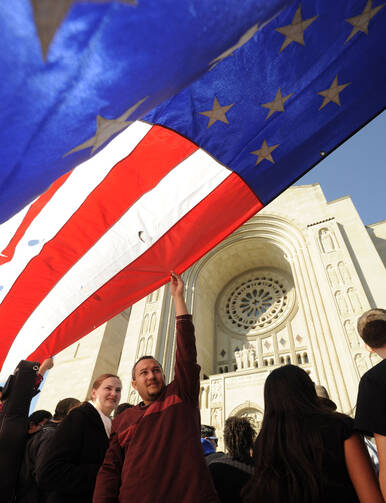I never expected to see Father Henry Davis’s Moral and Pastoral Theology (1935) cited in a Supreme Court opinion. But there it was in footnote 34 of Justice Samuel Alito’s opinion in Burwell v. Hobby Lobby, in which the Court ruled that two non-Catholic families, the Greens and the Hahns, were not required to comply with the contraceptive mandate of the Affordable Care Act. Father Davis was an English Jesuit and famous moral theologian who died in 1952 at age 85. The string cite quotes Father Davis’s text as follows: “Cooperation occurs ‘when A helps B to accomplish an external act by an act that is not sinful, and without approving of what B does.’”
Davis was one of the best practitioners of the old art of the Catholic moral manual, books that were usually written by priests for other priests. The manuals presented illustrative “cases of conscience,” so that priests could give moral guidance to Catholics as well as learn to assess what was sinful in the confessional. Davis was particularly incisive in writing about the principles of formal and material cooperation with evil. Many of his cases centered on medical ethical questions of cooperation with “evil” procedures and employees’ participation in “evil” actions commanded by an employer.
Today Davis was cited on behalf of the employers, the Green family in Hobby Lobby and the Hahn family in Conestoga Wood. The legal context was that plaintiffs must establish that the government substantially burdened their exercise of religion in order to win a Religious Freedom Restoration Act (RFRA) claim. The Greens and Hahns believe that 4 of the 20 contraceptives covered by the contraceptive mandate are abortifacients and that providing insurance coverage to employees was a substantial burden on this belief.
Justice Ginsburg cogently argued in dissent that any burden on the Greens’ and Hahns’ religion was “too attenuated” to qualify as substantial. The employees decide whether to use contraception, and “no individual decision by an employee and her physician….is in any meaningful sense her employer’s decision or action.”
Justice Alito rebutted that legal argument with Catholic moral theology. Hobby Lobby, he wrote, citing Father Davis, “implicates a difficult and important question of religion and moral philosophy, namely, the circumstances under which it is wrong for a person to perform an act that is innocent in itself but that has the effect of enabling or facilitating the commission of an immoral act by another.” It is not for the Court, he concluded, to determine whether a burden is substantial or insubstantial under RFRA; that is the moral judgment of the plaintiffs and the Court must simply defer to it, even when that moral belief may conflict with the beliefs of individual employees.
Yet interpreting statutory language like “substantial burden” is precisely what the Court is supposed to do. In deferring completely to plaintiffs’ moral beliefs, Justice Ginsburg is correct that the majority provided a “decision of startling breadth,” possibly applying to “employers with religiously grounded objections to blood transfusions (Jehovah’s Witnesses); antidepressants (Scientologists); medications derived from pigs, including anesthesia, intravenous fluids, and pills coated with gelatin (certain Muslims, Jews and Hindus); and vaccinations (Christian Scientists, among others).”
Would moral theology say that opening the door to all these possible exemptions—and more—involved some evil? Too bad we can’t ask Father Davis, who would probably be surprised to find himself in the midst of a U.S. Supreme Court debate.
Leslie C. Griffin is the William S. Boyd Professor of Law at the University of Nevada, Las Vegas, Boyd School of Law.








